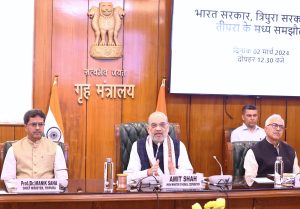On March 2, 2024, a historic event unfolded in Delhi as India’s central government, Tripura’s state government, and the Tipra Motha party, led by Maharaja Pradyot Bikram Manikya Debbarma, signed the Tiprasa Accord. Unlike previous agreements with armed insurgent groups such as the Tripura National Volunteers (TNV), this accord symbolized a unique collaboration between the government and a non-armed political entity.
India’s Home Minister Amit Shah hailed it as a milestone for Tripura. Maharaja Pradyot’s post-accord social media activity resonated widely, indicating strong support from Tripura’s populace.
Despite its potential to bring lasting peace to Tripura, opposition has emerged from political parties like CPIM Tripura, Congress, Ganamukti Parishad, and Tipraland State Party (TSP). Critics question the accord’s sincerity, especially amid impending Lok Sabha elections. They highlight implementation concerns, vague content, and a failure to address vital issues such as the formation of the Joint Working Committee and aspirations for “Greater Tipraland.” Tripura’s history of insurgency and past failed agreements also cast doubt on the accord’s future.
In short, the Tiprasa Accord has been divisive, with both supporters and opponents. If major political parties and part of the population oppose it, what does this mean for its future? Will it suffer the same fate as past agreements in Tripura?
Understanding the history of insurgency in Tripura requires examining both international and internal factors shaping the conflict. External factors, such as the role of Christian missionaries, arms smuggling, and support from external actors, alongside internal issues like migration, land disputes, and economic marginalization, have fueled the insurgency.
Since 1947, massive migration to Tripura has led to demographic shifts, exacerbating tensions. Political movements like the Tripura Upajati Juba Samiti (TUJS) demanded self-governance and autonomy, while armed groups like the Tripura National Volunteers (TNV) and All Tripura Peoples Liberation Organization (ATPLO) emerged, initiating an insurgency with external support. Ethno-political conflicts between tribal and non-tribal populations intensified, leading to widespread violence, such as the 1980 riots.
Despite government efforts to address insurgency through coercion, reintegration, and agreements with rebel groups, including the recent Tiprasa Accord, peace remains elusive due to ongoing ethnic tensions, migration issues, and economic challenges.
Past agreements in Tripura have yielded no results. Will the Tiprasa Accord face a similar fate?
Historical evidence suggests it’s possible. Exploring three key factors – agreement design and content, opposition due to exclusivity, and the role of third parties in implementation – may answer this crucial question.
Research by scholars such as Ramzi Badran, Marie Olson Lounsbery, Scott Gates, Caroline Hartzell, and Madhav Joshi shows that peace agreements cover various crucial elements, including political reforms, human rights, disarmament, amnesty, security, power-sharing in territorial, political, economic, and military aspects; and mechanisms for transitional power-sharing, dispute resolution, and verification. Scholars agree that the effectiveness of an agreement depends on its design and content. Without proper safeguards, implementation may falter, leading to uncertain public support and risking the agreement’s future. Based on this body of research, uncertainty persists regarding the future direction of the Tiprasa Accord due to the absence of specific plans concerning certain political and economic issues agreed upon by the signatories within the agreement’s three paragraphs.
The success of any agreement hinges on inclusivity. Exclusive agreements face implementation challenges, risking the emergence of spoiler groups. Scholars like Stephen John Stedman, Lisa Blaydes, and Jennifer De Maio suggest that aggrieved parties may resort to violence to disrupt agreements. In Tripura, the Tiprasa Accord’s limited participation raises concerns. Opposition from CPIM Tripura and others underscores the lack of consensus. Neglect of civil society and gender representation further undermines the accord’s legitimacy. As Celia McKeon suggested, broader participation in peace discussions is vital for enduring peace. The Tiprasa Accord’s future remains uncertain amid exclusivity and opposition.
Governments may enter agreements for reputation, electoral, or strategic reasons. After an agreement, when insurgents surrender their weapons, it significantly strengthens the government’s power, which could lead to potential exploitation. Under this uncertainty, insurgents require post-surrender security guarantees. Third-party involvement, whether from the United Nations or regional alliances, is crucial for security guarantees and monitoring agreement compliance. Without external oversight in the Tiprasa Accord, its fate primarily relies on the sincerity and political will of the Indian government.
In conclusion, the track record of agreements in Northeast India casts doubt on the prospects of the Tiprasa Accord’s success. As Professors Kamal Singh and M. Amarjit Singh outlined in their work “Politics of Peace Accords in Northeast India,” only the 1986 Mizoram Accord has achieved notable success. Hence, Tiprasa people will need to wait and see which path their leader, Maharaja Pradyut, and the Tipra Motha Party will take if the accord is not implemented.

































